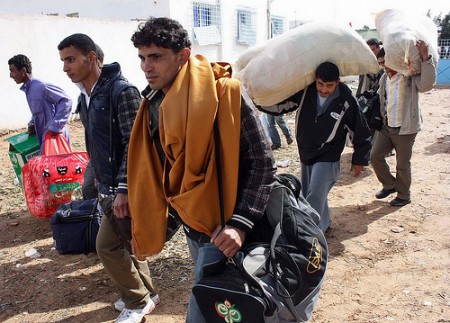
The Kuwait Times reports that before the uprising, there were some 2.5 million migrant workers from various countries in Libya. Some have since returned to their native country on their own, while some required consular or diplomatic assistance. According to international migration officials, 191,748 foreign migrant workers have already left Libya. Of these, 104,275 crossed into Tunisia, 84,973 to Egypt, 2,500 to Niger and 4,000 went to Algeria.
The situation of the remaining migrant workers is tenuous: They have been left to fend for themselves, after employers abandoned them. Unskilled workers do not dare go out as they are fearful of being shot, either by protesters or by forces loyal to Muammar al-Gaddafi. With food, water and medicine shortages, local shops are selling the few available products to Libyan citizens, not migrant workers. This has meant some workers have no money or food, and are approaching the verge of starvation.
The governments of developing countries in Asia – such as Bangladesh, the Philippines, Thailand, and India – are struggling to evacuate their nationals from Libya. Among the masses of foreign workers trapped in Libya and desperate to leave, migrants from Bangladesh comprise the largest number of foreigners ensnared in the crisis and unable to flee.
In a recent article, World Bank senior economist Jahed Hossain Khan said that the World Bank will loan Bangladesh $30 million for the evacuation of expatriates from Libya.
